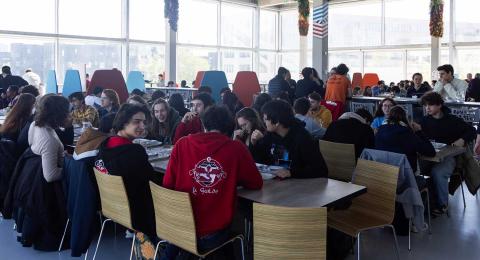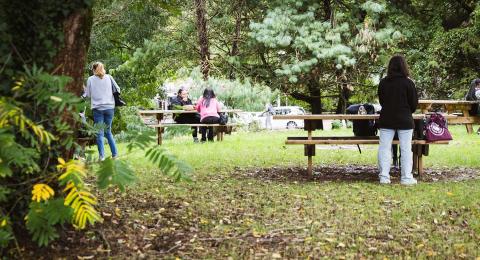The formation Soil and Ecosystem Services Management trains highly qualified professionals in the field of soils. It combines in-depth knowledge of the multiples dimensions of soils and their integration into applied courses, including fieldwork. Upon completion of the program, you will be able to assess the condition, functions and services of soils and propose innovative solutions for soil management and conservation, from the local to the global level.
The first semester consists of 10 compulsory modules and 2 optional modules designed to impart a wide range of high-level fundamental knowledge and applied skills relating to soils. It is structured around three types of module:
The disciplinary modules deal with soils, including through fieldwork, from diverse and complementary naturalistic, biological, physical, chemical, or socio-legal perspectives;
The tool modules focus on tools and methodologies for analyzing and modeling soils in space and time;
The integrative modules build on the knowledge and skills acquired to address major environmental or agricultural issues related to soils (management of polluted soils, management of erosion, adaptation to climate change, etc.).
The second semester is devoted to a long-term internship (5 to 6 months) in research or research and development carried out in a public or private organisation in France or abroad. It is combined with a bibliographic synthesis (in English).
Information
Skills
Describe a soil profile based on observations made using an auger or soil pit;
Collect soil samples, define an anlytical or experimental program and interpret the results obtained in a relevant manner, taking into account the objectives of the study;
Explain soil formation based on the pedogenetic factors and processes that control it;
Represent, analyse and interpret the spatial variability of soils in a given area (toposequence, watershed, region, globe);
Assess the biological, chemical or physical functionning of soil based on its characteristics and estimate the functions and services it provides in a given socio-ecosystem.
Objectives
The Soil and Ecosystem Services Management programme aims to prepare future graduates to design and manage research or research and development projects related to soils or the ‘soil’ dimension of multi-purpose projects, from the local to the global level. These projects may focus not only on agricultural or forestry production issues, but also on issues related to all the functions performed by soils in relation to socio-ecosystems (regulation of water quantity and quality, regulation of contaminants, carbon storage and greenhouse gas regulation, nutrient supply, support for biodiversity, etc.). The aim will therefore be to train professionals with an in-depth and comprehensive knowledge of soils, their diversity, their spatial organisation at different scales, their biological, physical and chemical functioning, as well as the main actors, legislation and public policies focused on soils, in order to bring soil issues for the benefit of their many users.
Upon completion of the programme, graduates will be able to:
- Describe and name a soil according to different national or international typologies;
- Identify the factors and processes involved in soil formation and evolution (pedogenesis);
- Characterise and interpret, for the benefit of multiple soil users: the diversity, properties, functions and services of soils, as well as the threats affecting them from the (micro)local to the global level;
- Propose and/or implement soil management, conservation, restoration or creation strategies tailored to the objectives of decision-makers and soil users.
Career Opportunities
Career prospects
Chargé d'études environnement
métiers de la recherche
Services agricoles, environnement ou développement durable, aménagement des collectivités ou services de l’Etat
Further Study Opportunities
Doctorat
Fees and scholarships
The amounts may vary depending on the programme and your personal circumstances.
Admission Route
Capacity
Available Places
Target Audience and Entry Requirements
The Soil and Ecosystem Services Management programme is open to students who have completed a Master's 1 degree in Earth Sciences, Environmental Sciences, Ecology, Agronomy or Forestry, particularly those with a specialisation in ‘Earth and Planetary Sciences, Environment’ or ‘Agrosciences, Environment, Territory, Landscape, Forest’.
Students holding a Master's 1 degree in related fields (geography, planning and development, political, economic or social sciences, etc.) may also be admitted on a case-by-case basis, provided that their change of field is carefully considered and justified by a project directly and specifically related to soils.
Students must have a minimum knowledge of soil science, equivalent to a module of approximately 30 hours in the timetable.
Application Period(s)
From 15/02/2026 to 15/06/2026
Supporting documents
Compulsory supporting documents
Motivation letter.
All transcripts of the years / semesters validated since the high school diploma at the date of application.
Curriculum Vitae.
Additional supporting documents
Referring contact information (compulsory for non-international applicants).
Certificate of French (compulsory for non-French speakers).
Detailed description and hourly volume of courses taken since the beginning of the university program.
VAP file (obligatory for all persons requesting a valuation of the assets to enter the diploma).
The application procedure, which depends on your nationality and your situation is explained here : https://urlz.fr/i3Lo.
Supporting documents :
- Residence permit stating the country of residence of the first country
- Or receipt of request stating the country of first asylum
- Or document from the UNHCR granting refugee status
- Or receipt of refugee status request delivered in France
- Or residence permit stating the refugee status delivered in France
- Or document stating subsidiary protection in France or abroad
- Or document stating temporary protection in France or abroad.










